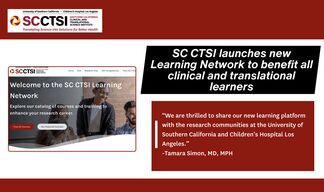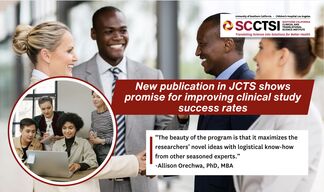Emerging Technologies and Treatments is Topic of Latest Regulatory Science Bootcamp
The seminar investigated the regulatory, scientific, and logistical considerations in clinical trials involving emerging technologies, cutting edge devices, immunotherapies, gene therapies, and stem cell therapies.
All research personnel, including sponsors, IRBs, and sites, must ensure that they are following Good Clinical Practices (GCP), even when working with new technologies and treatments. This becomes difficult when these new technologies and treatments are not well understood. Furthermore, FDA guidance and other standards may not yet exist for newer innovations.
Emerging technologies and treatments, such as tissue engineered products, gene and cell therapies, immunotherapies, cutting edge devices, and information technologies were the topic of the latest in a series of regulatory science bootcamp seminars, held in October at the USC Health Science Campus.

Attendees in the latest regulatory science bootcamp held in October by the SC CTSI
“We are at a critical moment where advances in science are leading towards fundamental changes in the way medical treatments and diagnostics are being developed and used,” according to the FDA.
“(But) regulations cannot keep up with innovation,” said Nancy Pire-Smerkanich, DRSc, MS, Assistant Professor of Regulatory and Quality Sciences at the International Center for Regulatory Science, based at USC’s School of Pharmacy.
Given the pace of innovation, sponsors including pharmaceutical and device companies are both developing new products and helping to build the framework for regulating them.
For example, the FDA has not yet published guidelines for addressing adverse events in stem cell therapies, although there are over 500 open clinical trials using stem cell therapies, explained Michael Jamieson, DRSc, MS, Assistant Professor of Regulatory and Quality Sciences at the International Center for Regulatory Science. This is significant because the FDA is mainly concerned with safety in first-in-human clinical trials: the lack of published guidelines demonstrates that the FDA does not yet know how to regulate some of the new products being tested in clinical trials.
While advancements in science and technology can lead to success, failures are also inevitable, and in clinical trials, such failures can lead to the harm or death of participants.
For example, innovation in gene therapy was halted in the late 1990s after 18-year-old Jesse Gelsinger was administered gene therapy, suffered a serious immune response, and died.
Yet innovation remains crucial. “UCLA researchers have restored immune systems using gene therapy,” explained Paula Kaplan-Lefko, PhD, a UCLA Project Scientist, adding that, “30/30 ‘bubble babies’, babies born with ADA-SCID, have been cured.”
Topics covered in the recent bootcamp included other immunotherapies, which are primarily targeted for use in cancer, discussed by Steven Swanson, MD, of ImmunoCellular Therapeutics.
Immunotherapies are now highly regulated, especially after deaths associated with Juno Therapeutics’ CAR-T cell trials. All companies that have FDA-approved CAR-T cell therapies, like Novartis’ Kymriah, must adhere to FDA Risk Evaluation and Mitigation Programs to manage adverse events like cytokine release syndrome and other neurotoxicities.
Jerry Loeb, MD, Professor of Biomedical Engineering, Neurology, and Pharmacy at the Viterbi School of Engineering, discussed regulatory considerations in research involving cutting-edge devices.
Loeb's team developed a minimally invasive fetal cardiac micropacemaker to treat heart block, a condition that leads to nearly 100% mortality before delivery. After preclinical studies in animals, they are ready for first use in a human as a custom medical device. Loeb discussed routes to regulatory approval and commercialization for orphan medical products such as the humanitarian use designation for the fetal pacemaker.
Bootcamp lecturers Jonathon Cotliar, MD, Vice President of Medical Affairs and Lisa DiMolfetto, PhD, Vice President of Regulatory Affairs for Science37, a Los Angeles-based technology-enabled clinical research company, discussed new technologies that aide in the conduct of virtual clinical trials. They discussed their product, NORA, which incorporates remote communication strategies and electronic data collection.
Such virtual technologies could greatly expand and improve clinical research. Because only about 50 percent of clinical trial sites meet recruitment goals and less than three percent of Americans participate in clinical trials, virtual technologies bring more participants into the process. Virtual technologies have been used in a variety of conditions, including acne, diabetes, mental health disorders, and cluster headaches.
The day-long regulatory science bootcamps bring in lecturers from the academic research community and industry to explore a different aspect of regulatory science and clinical research through lecture presentations and workshop exercises. The bootcamps, co-sponsored by the USC International Center for Regulatory Science, the Southern California Clinical and Translational Science Institute, and the Greater Los Angeles CTSA Consortium, continue to be sold-out affairs, attracting members of the research community from USC/CHLA, the Southern California region, and beyond.
Keep an eye out for the next bootcamp, to be announced by the USC International Center for Regulatory Science.



